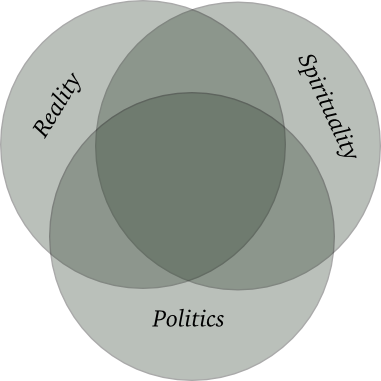I HAVE A STARTING place for this particular post—or series—but even as I begin to write, I have no idea where it will lead because there are so many connections to follow up.
It would probably be a good idea to start at the beginning by giving you a sort of map of the territory I had in mind when I started the daily mull almost four years ago:

I didn't have it so clearly pictured when I started, but my intuition was that we, in the United States and possibly in the world of humanity at large, were facing a crisis in two areas—spirituality and politics—and that these crises were intimately connected.
The connection was fairly obvious on the surface: the religious right forming the backbone of the political right within the United States, and together standing in a sort of belligerent opposition to the rest of the country.
But I felt the connection was deeper than the current political alignments, that there was something deeper involved—a split in how, and even whether, each side dealt with reality.
It was only an intuition at the beginning, buttressed by my experience at the time in three fields: education, philosophy, and Christian spirituality.
But over the years of writing as "daily" as I can manage (I ended the last post on Tuesday by promising to post this one "tomorrow", and actually was very sure I would at the time...) I have come to see some things more clearly.
I'm tempted at this point to mount a detailed defense, to my atheist and fundamentalist friends alike, of my use of the words "spiritual" and "spirituality" in this connection, but I'll leave that for another time.
For now, I'll simply tell you what I mean by spirituality in this context, so that we can move forward.
The word "spirituality" has a fairly common meaning in whatever tradition you find it.
It's simply the way in which a person, or a group of people, go about trying to be the best humans they can be.
It's more than conventional morality, which is focused on whether one act or another is merely "right" or "wrong"—it has to do with our entire quality of life, and how we go about living it.
With that in mind, you could reinterpret the chart above as dealing with three questions:
- How should we best go about being humans—both individually and as communities?
- How should we deal with issues of power, and what kind of institutions and policies do we want to live with?
- How do we stay rooted in the real world, in both those spheres?
What should our attitude toward reality be?
It's blatantly obvious to anyone who thinks about it that those three questions are so deeply and intimately intertwined that it's impossible to consider any one of them without considering the others.
It's also obvious that this trinity of questions is equally important whether we're talking about
- our very personal meditations and sense of self and our place in the universe,
- our dealings with others both personally and professionally, or
- our choice of political parties or stances on national or international issues.
These three questions are, in fact, what the "culture war" is being fought over, and although there's a lot to be said about both spirituality and politics, the key to understanding what's going on lies in the attitudes the respective sides have toward reality.
Next: The Courage to Face the Real






